Herbology
What Does a Herbalist Do?
Treating the whole person, not just symptoms, herbalists uncover the root causes of illness to craft personalized prescriptions for optimal wellness.

As herbalists, we use plants to promote health and well-being, conducting clinical exams to identify the root cause of illnesses and creating personalized herbal prescriptions based on symptoms. We focus on holistic wellness and natural healing, drawing on ancient traditions of herbal medicine that emphasize prevention and wellness. Our rigorous training and clinical experience enable us to create customized treatment plans, combining high-quality herbs in precise ratios for synergistic effects. From patient consultations to collaboration with healthcare providers, we take a thorough approach to restore balance and promote overall well-being – and there's more to discover about the art and science of herbalism.
Key Takeaways
• A herbalist conducts clinical exams to identify the root cause of illnesses and creates personalized herbal prescriptions based on symptoms.
• They focus on holistic wellness and natural healing, using plants to treat a wide range of ailments and prevent illnesses.
• Herbalists take a thorough approach to patient consultations, gathering essential information about medical history, symptoms, and lifestyle.
• They design custom remedies tailored to address the root cause of illness, considering physical, emotional, and herbal interactions in treatment plans.
• Herbalists continuously educate themselves on the latest research and herbal traditions, ensuring necessary knowledge and expertise for treatment plans.
What Is a Herbalist?
We often think of herbalists as wizards of the plant world, but what exactly does this profession entail?
As it turns out, a herbalist is a trained professional who uses plants to promote health and well-being. They don't just prescribe herbal remedies willy-nilly; they conduct clinical exams to identify the root cause of illnesses. This allows them to create personalized herbal prescriptions based on individual symptoms and needs.
Their treatments can come in various forms, such as teas, capsules, oils, and creams. Herbalists are skilled in selecting herbs that address specific health issues and support holistic wellness. They're not just dispensing medicine; they're practitioners of a specialized form of medicine that focuses on prevention and natural healing.
In essence, a herbalist is a holistic healthcare provider who taps into the therapeutic potential of plants to restore balance and promote overall well-being.
Education and Qualifications

As we explore the world of herbalism, it's clear that a strong educational foundation is key to becoming a skilled practitioner, and that's why herbalists typically hold a BSc degree in Herbal Medicine and undergo rigorous training. This thorough education prepares them to use herbal remedies effectively and safely, often working alongside medical doctors and other healthcare professionals.
Our training includes over 500 hours of clinical experience, covering anatomy, physiology, and nutrition, which enables us to create personalized prescriptions for patients based on detailed information and assessments. We're trained professionals who consider the whole person in our treatment approach, focusing on the root causes of illness rather than just symptoms.
As members of the National Institute of Medical Herbalists, we adhere to high ethical standards in our practice, ensuring that our patients receive the best possible care. With our extensive education and training, we're well-equipped to provide expert guidance on the safe and effective use of herbal remedies, helping our patients achieve optimal health and wellness.
Herbal Medicine Background

As we explore the world of herbal medicine, we're drawn to the rich tapestry of ancient healing traditions that have shaped this practice.
From traditional Chinese medicine to Ayurvedic principles, we find that medicinal plants have been used for centuries to prevent and treat various health conditions.
We'll examine the fascinating history of medicinal plants, tracing their use from ancient civilizations to modern times.
Ancient Healing Traditions
Rooted in ancient civilizations, herbal medicine has thrived for thousands of years, with the Egyptians, Greeks, and Chinese leveraging its potency to heal and promote wellness. We've inherited a rich legacy of traditional healing systems, such as Ayurveda, Traditional Chinese Medicine, and Native American medicine, which heavily rely on herbal remedies. These ancient healing traditions have been passed down through generations, with modern pharmaceuticals even drawing inspiration from them.
Some key aspects of ancient herbal medicine include:
- Emphasis on natural compounds: Herbal medicine emphasizes using whole plants and natural compounds to treat illnesses and promote overall wellness.
- Global reliance: The World Health Organization (WHO) estimates that 80% of people worldwide rely on herbal medicine for primary health care.
- Pharmaceutical origins: Many modern pharmaceuticals have origins in herbal medicine, with aspirin originating from willow bark and quinine from cinchona bark.
- Holistic approach: Herbal medicine takes a holistic approach to health, focusing on prevention and wellness rather than just treating symptoms.
- Enduring legacy: Despite the rise of modern medicine, traditional herbal healing traditions continue to thrive, offering a unique approach to health and wellness.
Medicinal Plant History
We've been exploring medicinal plants for thousands of years, with evidence of herbal remedies dating back to around 3,000 BC. As we investigate the medicinal plant history, we find that various cultures developed traditional medical systems based on the use of herbs for healing purposes.
In traditional herbal medicine, plants have been used to treat a wide range of ailments, from common colds to complex diseases. Throughout recorded history, herbal medicine has played a significant role in maintaining health and wellness. In fact, today, 80% of people worldwide rely on herbal medicines for their primary health care needs.
The use of herbal medicine is becoming more mainstream, thanks to advancements in quality control and clinical research. As a result, we're seeing a resurgence of interest in natural remedies, particularly in the U.S., where public interest in herbal medicine is on the rise.
When we explore the role of a herbalist, understanding the rich history and significance of herbal medicine in our lives is crucial.
Typical Day of an Herbalist

As herbalists, we begin our day by reviewing patient files and preparing for consultation sessions. During these sessions, we gather information on symptoms and medical histories to determine the best course of treatment. We conduct physical assessments and create personalized prescriptions, which may include teas, tinctures, capsules, or topical treatments.
Our day is filled with a mix of client meetings, herbal remedy preparation, and collaboration with other healthcare professionals to guarantee thorough care.
Morning Routine
We kick-start our day by reviewing patient appointments and preparing herbal remedies, ensuring we're well-equipped to tackle the busy day ahead. As herbalists, our morning routine sets the tone for a productive day of helping patients achieve peak health.
Here's a snapshot of how we spend our morning:
- Reviewing patient appointments and preparing individualized herbal remedies
- Researching new herbs and staying updated on the latest developments in herbal medicine
- Tending to our medicinal gardens or foraging for wild herbs to use in treatments
- Conducting patient consultations, discussing symptoms and health concerns
- Documenting patient progress, adjusting treatment plans, and researching herbal formulations
Consultation Sessions
During consultation sessions, we thoroughly explore clients' medical histories, symptoms, and lifestyle habits to craft personalized herbal treatment plans that address their unique needs. We delve into the root causes of their illnesses to provide holistic treatment approaches that cater to their individual requirements. These sessions involve discussing dietary recommendations, lifestyle changes, and the use of herbal remedies to promote overall wellness.
Through these consultation sessions, we gain a thorough understanding of each client's needs, enabling us to create effective, personalized herbal treatment plans that address their specific health concerns. By taking a holistic approach, we empower our clients to make informed decisions about their health and set off on a path towards wellness.
Herbal Remedies Creation
After crafting personalized treatment plans, we head to our apothecary to create custom herbal remedies that bring these plans to life. We carefully select and combine herbs to address specific symptoms or underlying health issues, ensuring each remedy is uniquely tailored to the patient's health goals and preferences.
Our herbal formulations may take the form of teas, tinctures, capsules, or topical treatments, depending on the patient's needs and preferences. We work to optimize the effectiveness of our herbal formulations through ongoing consultations and adjustments.
Some of the key aspects of our herbal remedies creation process include:
- Selecting high-quality herbs that meet our stringent standards
- Combining herbs in precise ratios to achieve synergistic effects
- Adapting formulations based on patients' feedback and progress
- Ensuring remedies are free from contaminants and adulterants
- Continuously educating ourselves on the latest research and herbal traditions
Patient Consultation Process

As herbalists, we take a thorough approach to patient consultations, gathering essential information about medical history, symptoms, and lifestyle to identify the root cause of illnesses. We believe that understanding the complexities of our clients' health is vital in providing holistic care.
During patient consultations, we focus on identifying the underlying factors contributing to their conditions, rather than just treating symptoms. This involves performing physical assessments, when necessary, to gain a deeper understanding of their overall health.
By doing so, we can create personalized treatment plans that address the unique needs of each individual. Our patient consultations are an essential step in providing tailored care, as they allow us to develop effective treatment strategies that incorporate herbal remedies.
Creating Personalized Treatment Plans

As herbalists, we recognize that every individual's health needs are unique, so we assess each patient's health needs, considering factors such as medical history, symptoms, and lifestyle.
This information enables us to design custom remedies, tailored to address the root cause of the illness, and support the body's natural healing processes.
Assessing Health Needs
When we sit down with a patient, we begin by conducting a thorough consultation to gather detailed information about their medical history, lifestyle, and health goals. This vital step allows us to understand the complexities of their health needs and create a personalized treatment plan that addresses their unique requirements.
To assess health needs, we consider the following factors:
Medical history: We examine the patient's past illnesses, allergies, and medications to identify potential interactions with herbal remedies.
Lifestyle: We evaluate their diet, exercise routine, and stress levels to determine how these factors impact their overall health.
Health goals: We work with the patient to establish realistic health objectives and develop a tailored plan to achieve them.
Physical and emotional factors: We consider the patient's physical and emotional well-being, including their mental health, to make sure our treatment plan addresses their holistic needs.
Herbal interactions: We assess potential interactions between herbs and the patient's existing medications or health conditions to guarantee safe and effective treatment.
Designing Custom Remedies
We craft custom remedies by carefully selecting and blending herbs that specifically target the patient's unique health concerns and needs. As herbalists, we recognize that each individual's health journey is distinct, and a one-size-fits-all approach simply doesn't cut it. That's why we take the time to design personalized treatment plans that address the root cause of illness and support the body's natural healing processes.
| Custom Remedies | Individualized Treatment |
|---|---|
| Teas, tinctures, capsules, or topical applications | Tailored to the patient's unique needs and preferences |
| Herbal formulations adjusted based on patient response | Dosages and formulations adjusted during treatment |
| Addressing the root cause of illness | Supporting the body's natural healing processes |
| Targeting specific health concerns and needs | Considering medical history and overall health |
| Ongoing monitoring and adjustments | Ensuring best health outcomes |
Collaboration With Healthcare Providers

Herbalists partner with Western medical practitioners to provide thorough care, integrating herbal remedies with conventional treatments to offer patients a more holistic approach to healing. This collaboration enables us to complement traditional medicine with natural remedies, providing patients with a well-rounded treatment plan. We believe that interdisciplinary teamwork is essential in guaranteeing our patients receive the best possible care.
Some key aspects of our collaboration with healthcare providers include:
- Receiving referrals from primary care physicians for patients seeking herbal treatment options
- Working alongside doctors, nurses, and other healthcare professionals to develop personalized treatment plans
- Providing educational resources to healthcare providers on the safe and effective use of herbal remedies
- Participating in interdisciplinary team meetings to discuss patient care and develop well-rounded treatment strategies
- Staying up-to-date on the latest research and developments in herbal medicine to ensure our patients receive the most effective and safe treatments available
Herbal Remedies and Products

Seven out of ten herbal remedies in our practice are formulated using actual herbs, rather than synthetic compounds, to guarantee the preservation of the plant's natural benefits. We find that using organically grown herbs secures the highest quality and effectiveness in our formulations.
By avoiding standardized extracts, we can maintain the complex balance of compounds present in the plant material, which is crucial for achieving the desired therapeutic effects. To extract active compounds from herbs, we employ various methods, including using oil, water, ethanol, or pressure. This allows us to create customized formulations tailored to address specific health needs and conditions.
Our herbal remedies are crafted to provide a holistic approach to wellness, and we take pride in our ability to create unique blends that cater to individual requirements. By combining our knowledge of herbalism with cutting-edge extraction methods, we're able to offer effective and natural solutions for our clients.
Benefits of Seeing an Herbalist

By incorporating herbal remedies into our wellness routine, we can experience a more holistic approach to healthcare that addresses our unique needs and promotes overall well-being. By seeing an herbalist, we can benefit from personalized treatment plans tailored to our specific health concerns.
Here are just a few benefits of seeing an herbalist:
- Herbalists provide natural alternatives with antioxidant and anti-inflammatory properties, supporting the body's healing processes.
- They offer clinical herbal medicine, considering physical, mental, emotional, social, spiritual, and economic factors in their practice.
- We receive personalized treatment plans based on detailed patient information, focusing on the root cause of illness.
- Herbalists follow strict ethical standards, emphasizing quality control, safety precautions, and transparency in their practice.
- Patients referred to herbalists by conventional healthcare providers receive personalized herbal remedies alongside other treatments.
Finding a Qualified Herbalist

When searching for a qualified herbalist, we need to look for certain credentials and qualifications to make sure we're receiving the best possible care. We should seek a licensed herbalist who's undergone extensive training and holds formal certifications or degrees from reputable organizations. Membership in organizations like the National Institute of Medical Herbalists is a plus, as it guarantees the herbalist adheres to high ethical standards.
In addition, we should confirm the herbalist has a thorough understanding of anatomy, physiology, and nutrition, as well as completing over 500 hours of clinical training. This ensures they've the necessary knowledge and expertise to provide effective treatment plans.
Moreover, asking for recommendations from our GP or healthcare provider can help us find a qualified herbalist. By doing our due diligence, we can rest assured that we're in good hands.
Frequently Asked Questions
What Are the Duties of a Herbalist?
We diagnose and treat health issues, creating personalized plans that address physical, mental, and emotional factors, while working alongside Western medical practitioners to provide holistic care to our patients.
What Can a Herbalist Treat?
We can treat a variety of health issues, from digestive problems and skin conditions to hormonal imbalances and stress-related ailments, as well as chronic conditions like arthritis and allergies, using natural herbal remedies.
Is an Herbalist a Real Job?
"We're often asked, 'Is being an herbalist a real job?' Yes, it is! We're trained professionals with extensive education and certifications, working alongside medical practitioners to provide holistic care to our patients."
Is an Herbalist a Doctor?
"We're often asked: is an herbalist a doctor? No, we're not medical doctors, but skilled professionals using plants for healing. We work with, not replace, conventional healthcare providers, focusing on whole-person care and natural remedies."
Conclusion
To sum up, as herbalists continue to play an essential role in modern healthcare, it's fascinating to note that a staggering 80% of the global population relies on herbal medicine as a primary form of healthcare.
As we work towards integrating herbalism into conventional medicine, we're reminded of the importance of collaboration and education.
By understanding the role of herbalists and their qualifications, we can better harness the potential of herbal remedies to improve our collective well-being.
Herbology
Herbs Used in Iron Butte Herbology
Among the rugged landscapes of Iron Butte, ancient secrets await discovery in the world of herbalism, where rare plants hold the key to survival.

We explore the world of Iron Butte herbology, where medicinal herbs like Water Hemlock, Bistort, Beargrass, Bitterroot, Agoseris, and Arrowhead plants have been used for their healing properties for generations. These plants treat various ailments and have been essential in traditional medicine. From berries like Bristly Manzanita to mushrooms like King Bolete, each herb has unique properties that enhance survival skills, combat capabilities, and overall well-being. As we venture into Iron Butte, we'll uncover more rare and uncommon herbs, and discover how they can be used to craft essential items and upgrades – and there's still more to uncover.
Key Takeaways
• Water Hemlock, Bistort, Beargrass, Bitterroot, Agoseris, and Arrowhead plants are used for medicinal benefits in Iron Butte herbology.
• Bristly Manzanita berries aid in digestive issues, boost the immune system, and alleviate sore throats and coughs with their astringent properties.
• Rattleweed, Bitterroot, Yarrow, and Wild Chamomile enhance various combat and survival skills in Iron Butte herbology.
• Beargrass, Larch Bolete, and Bistort are valuable medicinal herbs found in the Hidden Cavern and Secret Garden in Iron Butte.
• Agoseris, Arrowhead, and Beargrass are essential wildflowers with medicinal properties used for survival and crafting in Iron Butte.
Medicinal Herbs for Healing
As we explore the world of medicinal herbs in Iron Butte, we find that certain plants have been relied upon for their remarkable healing properties. While some may be familiar with the toxic Water Hemlock, which grows near Lost Lake, there are many other herbs in the region that have been used for centuries to promote health and wellness.
For instance, Bistort, commonly found in the Crater Lake region, is known for its healing properties and is used in Iron Butte for medicinal purposes. We've discovered that Beargrass, Bitterroot, Agoseris, and Arrowhead plants are also utilized for their medicinal benefits in Iron Butte. These herbs have been used to treat a variety of ailments, and their effectiveness has been passed down through generations of herbalists.
As we investigate further into the world of Iron Butte herbology, we're excited to learn more about the unique properties of these plants and how they're used to promote healing and wellness.
Berry Varieties in Iron Butte

As we explore the world of berries in Iron Butte, we're excited to examine the finer points of berry harvesting techniques and their medicinal properties.
We'll take a closer look at how to identify and collect these berries, and how they can be used to create remedies that aid in our survival.
Berry Harvesting Techniques
We head out to the diverse regions of Iron Butte to forage for an array of berry varieties, each with its unique characteristics and uses in herbology. As we venture into the wilderness, we employ specific berry harvesting techniques to guarantee the quality and integrity of our herbology collection.
When it comes to harvesting berries, we've developed a few strategies that have proven effective:
- Timing is everything: We time our harvests according to the ripeness of the berries, ensuring peak flavor and potency.
- Region-specific harvesting: We tailor our harvesting techniques to the specific region we're foraging in, considering factors like climate and soil conditions.
- Selective picking: We hand-pick berries to make certain only the best specimens make it into our collection.
- Preservation methods: We utilize various preservation methods, such as drying or freezing, to uphold the berries' medicinal properties.
Berry Medicinal Properties
What makes the berries of Iron Butte so remarkable is the diverse range of medicinal properties they possess. Among these, the Bristly Manzanita stands out for its impressive array of benefits.
We've found that the berries can be used to create a tea that may help with digestive issues, thanks to their astringent properties. Rich in antioxidants, they can also boost the immune system, providing an added layer of protection against illness.
In traditional medicine, the berries have been used to alleviate sore throats and coughs, making them a valuable resource for natural remedies. The high tannin content gives them a characteristic bitter taste, but it's a small price to pay for the benefits they offer.
When crafting remedies, it's essential to understand the unique properties of each berry variety, and the Bristly Manzanita is no exception. By harnessing its medicinal properties, we can unlock its full potential and create effective, natural solutions for a range of health concerns.
Mushrooms for Crafting Purposes

In the world of Days Gone, we forage for specific mushrooms in the Iron Butte region, like King Bolete and Larch Bolete, to craft essential items that aid our survival. These mushrooms play an important role in our crafting endeavors, allowing us to create essential items that boost our health and stamina.
Here are some key uses for mushrooms in crafting:
- Health Restoratives: We use mushrooms to craft health-restoring items, giving us a much-needed boost in combat.
- Stamina Boosters: Mushrooms help us craft items that increase our stamina, allowing us to take on more challenging tasks.
- Enhanced Combat: By crafting with mushrooms, we can create items that enhance our combat capabilities, making us more formidable opponents.
- Survival Aids: Mushrooms are used to craft items that aid our survival, such as shelter and protection from the harsh environment.
Toxic Plants to Avoid

While foraging for herbs in the Iron Butte region, it's vital to identify and avoid toxic plants like Water Hemlock, which can be fatal if ingested.
We should be cautious when searching for herbs, as mistakenly consuming poisonous plants can have devastating consequences.
Interactive Maps can be a helpful guide in identifying safe areas to forage, ensuring we avoid areas where toxic plants are known to grow.
Water Hemlock, in particular, is a toxic plant found in the Klamath Marsh region of Days Gone and should be avoided at all costs.
It's important to remember that Water Hemlock is poisonous if consumed and can be deadly in real life as well.
We should be mindful of our surroundings and avoid collecting Water Hemlock, especially during missions like 'I've Got a Plan'.
Let's prioritize our safety and well-being by being informed about the herbs we use for crafting.
Herbs for Enhancing Abilities

We shift our focus to the herbs that can enhance Deacon's abilities in Days Gone, which are scattered throughout the Iron Butte region. These herbs are essential for crafting useful items and upgrades, and we need to explore the region thoroughly to collect them all for maximum benefit.
By utilizing these herbs strategically, we can greatly improve Deacon's survival and combat skills.
Here are some of the key herbs we should look out for:
- Rattleweed: Enhances Deacon's melee combat skills, allowing him to take down enemies more efficiently.
- Bitterroot: Improves Deacon's agility, making it easier to navigate the Iron Butte region.
- Yarrow: Boosts Deacon's health, allowing him to withstand more damage in combat.
- Wild Chamomile: Enhances Deacon's stealth abilities, making it easier to sneak past enemies undetected.
As we go back to our Top Guide, we'll learn more about how to utilize these herbs effectively.
Rare Herbs in Iron Butte

As we venture into the domain of rare herbs in Iron Butte, we're thrilled to uncover the secrets of this unique region. We'll explore the hidden caverns and secret gardens that harbor these elusive herbs, and we're excited to share our discoveries with you.
From the rare Beargrass to the coveted Larch Bolete, we'll shed light on the hidden gems of Iron Butte's herbology.
Hidden Cavern Herbs Found
In our search for rare herbs in Iron Butte, we stumble upon the Hidden Cavern, a treasure trove of unique botanicals. This hidden gem is a prime location for gathering valuable herbs, making it a must-visit spot for any serious herbologist.
As we explore the cavern, we discover a variety of rare and useful herbs, including:
- Beargrass: A valuable herb for crafting and selling in Days Gone.
- Larch Bolete: A unique medicinal herb with special properties.
- Bistort: A special medicinal herb with various uses.
- Other rare herbs: We're not going to give away all our secrets, but trust us, there are more treasures to be found!
The Hidden Cavern is a veritable treasure trove of botanical wonders, and we're excited to share our discoveries with you.
Whether you're a seasoned herbologist or just starting out, this cavern is a must-visit destination in Iron Butte.
Secret Garden Discoveries
What secrets lie hidden within the lush confines of Iron Butte's Secret Garden, where rare and unique herbs await discovery? As we venture into this verdant oasis, we're on the hunt for the most elusive and valuable herbs in Iron Butte.
Our search yields treasures like Beargrass and Larch Bolete, coveted by crafters and traders alike. These rare finds are the epitome of Iron Butte's herbology, and we're thrilled to uncover them.
Exploring the Secret Garden is an experience like no other. Every hidden nook and cranny holds the promise of a new discovery, a chance to unearth a rare herb that could make all the difference in our crafting and trading endeavors.
We take pride in traversing the Garden's winding paths, driven by the excitement of the unknown. And when we stumble upon a particularly elusive herb, the sense of accomplishment is palpable. The Secret Garden offers a rewarding experience, one that we eagerly return to, always seeking the next hidden treasure.
Wildflowers With Medicinal Properties

We've discovered that certain wildflowers in the Iron Butte region, such as Beargrass, possess medicinal properties that make them valuable for crafting in Days Gone. These wildflowers aren't just a pretty face; they've real benefits for our survival.
- Beargrass: Found in Iron Butte, this wildflower is a staple for crafting medicinal items.
- Bitterroot: This wildflower, found in Central Belknap, is another herb with medicinal value in the game.
- Arrowhead: With its healing properties, this herb is valuable in multiple regions, including Iron Butte.
- Agoseris: This wildflower, found in Belknap region, is known for its medicinal benefits in Days Gone.
These wildflowers with medicinal properties are essential for our survival in the harsh world of Days Gone. By understanding their value, we can craft the items we need to stay alive.
Edible Plants for Survival

How do we stay fueled and nourished in the harsh world of Days Gone? When scavenging for resources, we often overlook the abundance of edible plants scattered throughout the Iron Butte region. Fortunately, we've discovered that certain plants can be harvested to replenish our health and gather valuable resources for crafting.
Beargrass, a common herb in the region, and larch bolete mushrooms are two examples of edible plants that can aid in our survival. By knowing their locations, we can stock up on these resources, ensuring we're well-equipped to take on the challenges of the post-apocalyptic world.
These plants can be used to craft essential items, providing us with a much-needed advantage in our fight against the Freakers.
Poisonous Plants in the Wilderness

As we venture into the wilderness, we need to be aware of the poisonous plants that can pose a threat to our survival.
We'll explore how to identify deadly plants, recognize toxic lookalikes, and avoid wilderness danger zones, so we can navigate the great outdoors with confidence.
Deadly Plant Identification
When venturing into the wilderness, we need to be aware of the deadly plants lurking in the shadows, particularly in areas like the Klamath Marsh. To guarantee our safety, we must identify and avoid poisonous plants. One such plant is Water Hemlock, a highly toxic species that can be found in the Klamath Marsh area.
Here are some key things to keep in mind when dealing with Water Hemlock:
- Availability: Water Hemlock may not be available for collection until certain story progression points in the game.
- Toxicity: Water Hemlock is a toxic plant, and we should exercise caution when collecting it.
- Research: Researching specific missions and progressing in the story can help us locate Water Hemlock in the game.
- Mission requirement: Water Hemlock can be collected during the mission 'I've Got a Plan.'
Recognizing Toxic Lookalikes
We've learned to identify and avoid deadly plants like Water Hemlock, but now we need to recognize their toxic lookalikes in the wilderness. It's essential to accurately identify plants before consuming them, as mistaken identity can be fatal.
Take Water Hemlock, for instance, which contains a deadly toxin called cicutoxin. This poisonous plant can be mistaken for edible plants like Bistort or Beargrass, commonly found in the Iron Butte region. While these lookalikes are safe for consumption, Water Hemlock is not.
To avoid poisoning, we must be able to differentiate between these plants. Consulting a plant identification guide or expert can help. We need to be cautious and vigilant when foraging in the wilderness, as the consequences of misidentification can be severe.
Wilderness Danger Zones
Venturing into the wilderness, we enter zones fraught with peril, where poisonous plants like Water Hemlock lurk, waiting to strike. As we explore the Klamath Marsh region, we need to be cautious of these deadly flora. Water Hemlock, in particular, is a plant we should be mindful of, especially during the mission 'I've Got a Plan'.
To avoid the dangers of these poisonous plants, here are some tips to keep in mind:
- Advance through the story: We may need to progress further in the game to find Water Hemlock and other toxic plants in the wilderness.
- Use maps and guides: These resources can help us locate Water Hemlock and other dangerous plants, ensuring our safety while exploring.
- Be aware of story progression points: The presence of Water Hemlock may be tied to specific story progression points, so we should be mindful of our progress.
- Stay vigilant: Always keep an eye out for poisonous plants like Water Hemlock, and avoid them to guarantee our survival.
Uncommon Herbs for Crafting
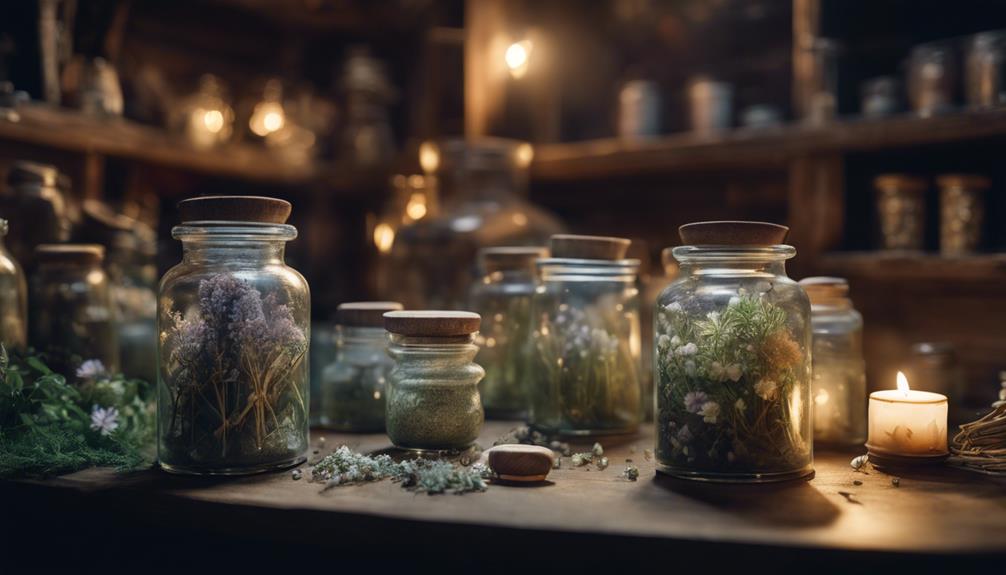
In our search for crafting materials, we uncover two uncommon herbs in Iron Butte that stand out for their utility: Beargrass and Larch Bolete. These herbs are essential for crafting specific items and upgrades in Days Gone, making them a valuable find for any player.
| Herb | Description |
|---|---|
| Beargrass | Found in the Iron Butte region, used for crafting various items. |
| Larch Bolete | A type of mushroom, collected for crafting purposes. |
To gather these uncommon herbs, we need to thoroughly explore the Iron Butte region. This requires venturing into the wilderness danger zones, where the risk of encountering hostile forces is high. However, the rewards are worth the risk, as these herbs can make a significant difference in our crafting capabilities. By knowing what to look for and where to find it, we can take our crafting to the next level and better equip ourselves for the challenges ahead. With Beargrass and Larch Bolete in hand, we're one step closer to becoming the ultimate survivor in the world of Days Gone.
Frequently Asked Questions
What Is the Herb 8 in Days Gone?
We're curious about the herb 8 in Days Gone, so let's explore further.
In the game, herb 8 is actually called Bistort. It's one of the collectibles you can find, and it's located in the Crater Lake region of Iron Butte.
We can sell it for cash or use it for crafting. We can even track our progress in the in-game menu.
That's the lowdown on herb 8 – it's Bistort, and it's waiting to be found!
Where Are the Cloudberries in Days Gone?
Let's get real, we're all thinking it – Cloudberries, where are you hiding?!
Okay, okay, we'll stop joking around. Seriously though, we've got the scoop.
To find those elusive Cloudberries in Days Gone, head to the Lost Lake region. Check the in-game collectible menu and maps for specific locations.
Trust us, it's worth the hunt – those Cloudberries are valuable for selling and crafting.
Happy hunting!
Where to Find Salmon Berry Days Gone?
We're on the hunt for Salmon Berry in Days Gone! To find it, we head to the Iron Butte region, where it's scattered throughout specific areas marked on our in-game map.
We can track our progress in the Collectible Menu, and a thorough exploration of the region increases our chances of stumbling upon this elusive herb.
Conclusion
As we conclude our exploration of Iron Butte herbology, we're reminded that a staggering 80% of the world's population relies on traditional plant-based medicine for their primary healthcare.
This statistic underscores the significance of understanding the medicinal properties of herbs, and we hope our guide has empowered you to venture into the wilderness with confidence, armed with knowledge to harness the healing power of nature.
Herbology
7 Must-Visit Herbology Locations for Aspiring Herbalists
Delve into the world's most enchanting herbology destinations, where ancient traditions and modern discoveries await, revealing the secrets of herbal medicine.
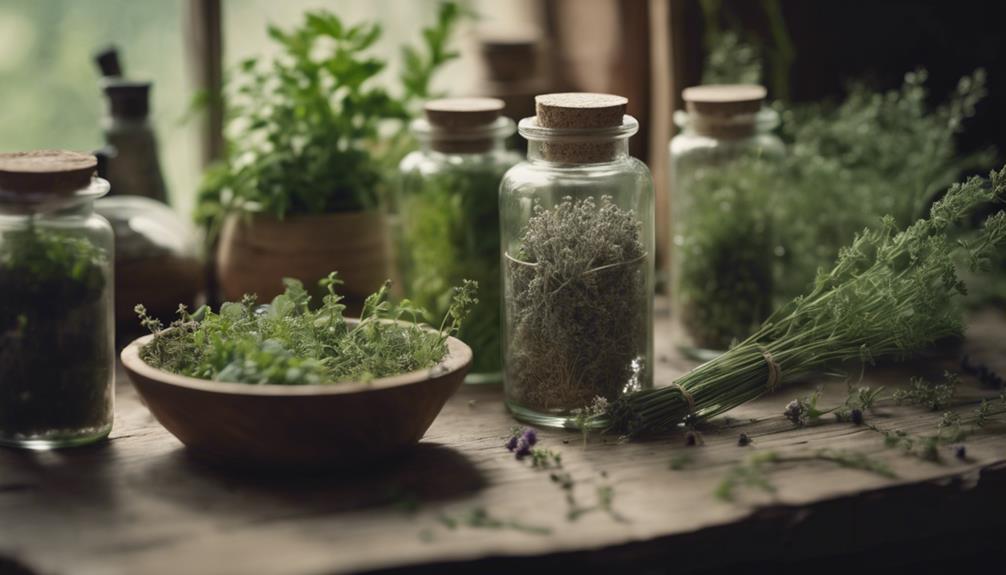
As we begin our journey to discover the world's most fascinating herbology destinations, we're drawn to 7 must-visit locations that promise to reveal our understanding of herbal medicine and expose the secrets of ancient traditions. From the Amazon Rainforest's medicinal treasures to India's Ayurvedic herb gardens, and from the Mediterranean's potent herbs to North America's botanical gems, each location offers a unique perspective on the power of herbs. We'll explore China's ancient traditions, reveal the secrets of Ayurveda, and discover Africa's diverse herbal heritage. As we venture further, we'll uncover more surprising connections between nature and health.
Key Takeaways
• The Amazon Rainforest offers a treasure trove of medicinal plants, traditional herbal remedies, and hands-on experience with plant biodiversity and conservation.
• India's Ayurvedic herb gardens provide opportunities to learn about cultivating Tulsi and Ashwagandha, and experience traditional harvesting practices.
• The Mediterranean region is home to potent herbs like lavender and thyme, with destinations like Provence and Tuscany offering immersion in herbology hotspots.
• North America's diverse landscapes hold botanical gems, with opportunities for foraging rare herbs like yarrow and oleander sage in destinations like Valentine and Diablo Ridge.
• China's ancient herbal traditions, with a 5,000-year-old heritage of herbal medicine, offer a rich history of herbal medicine and unique herbal treatments.
Exploring the Amazon Rainforest
As we venture into the Amazon Rainforest, we're not only surrounded by an astonishing array of medicinal plants, but we're also walking in the footsteps of indigenous tribes who've harnessed the forest's healing power for centuries.
The Amazon Rainforest is a treasure trove of medicinal plants, many of which have been used by local communities for centuries to create traditional herbal remedies. We're drawn to this lush environment because it's a hotspot for herbal medicine research, with many pharmaceutical drugs derived from plants found here.
As aspiring herbalists, we can explore the Amazon Rainforest through guided tours and botanical expeditions, learning about the cultural significance of these traditional remedies and their applications. By immersing ourselves in this unique ecosystem, we gain hands-on experience studying plant biodiversity and conservation.
The Amazon Rainforest offers an unparalleled opportunity to discover rare and unique plant species with potent healing properties, making it an essential destination for anyone passionate about herbology.
The Herbal Riches of India

As we explore the herbal riches of India, we're excited to discover the country's wealth of medicinal plants and traditional healing practices.
We'll be visiting Ayurvedic herb gardens, where we'll learn about the art of cultivating herbs like Tulsi and Ashwagandha for holistic wellness.
In the Himalayas, we'll experience the traditional harvesting practices that have been passed down through generations, giving us a deeper appreciation for the region's unique botanical heritage.
Ayurvedic Herb Gardens
We find ourselves immersed in the vibrant world of Ayurvedic Herb Gardens, where India's rich biodiversity converges with ancient wisdom to create a treasure trove of medicinal plants.
As aspiring herbalists, we're drawn to these gardens, which showcase a stunning array of plants renowned for their healing properties. We explore the gardens, discovering holy basil, turmeric, neem, and ashwagandha, each with its unique benefits.
The gardens offer more than just a stroll; they provide educational tours and workshops, teaching us about the cultivation, preparation, and use of Ayurvedic herbs in traditional medicine.
As we wander through the serene settings, we're not just learning about herbal medicine – we're experiencing a holistic approach to wellness. The gardens promote a deep understanding of the intricate connection between nature and human health, encouraging us to adopt a more balanced lifestyle.
Himalayan Herb Harvesting
In the Himalayan foothills, where India's rich biodiversity converges with ancient wisdom, we uncover a treasure trove of medicinal herbs prized for their potent health benefits and therapeutic uses. As aspiring herbalists, we need at least a basic understanding of the region's unique ecosystem to harness its herbal riches.
We make sure to explore regions like Uttarakhand and Himachal Pradesh, where rare herbs like Kutki, Jatamansi, and Guggul thrive. These herbs boast unique healing properties, making them valuable for traditional Ayurvedic practices and natural medicine. The Himalayas are home to a diverse range of adaptogenic herbs, which we can use to support our immune systems and alleviate stress.
We need to appreciate the region's biodiversity, which has been harnessed by Ayurvedic practitioners for centuries. By venturing into the Himalayan foothills, we can uncover the secrets of these medicinal herbs, prized for their potent health benefits and therapeutic uses. At least one visit to this region will leave us enriched with knowledge and inspired to incorporate these herbs into our herbalism practices.
Medicinal Marvels of the Mediterranean
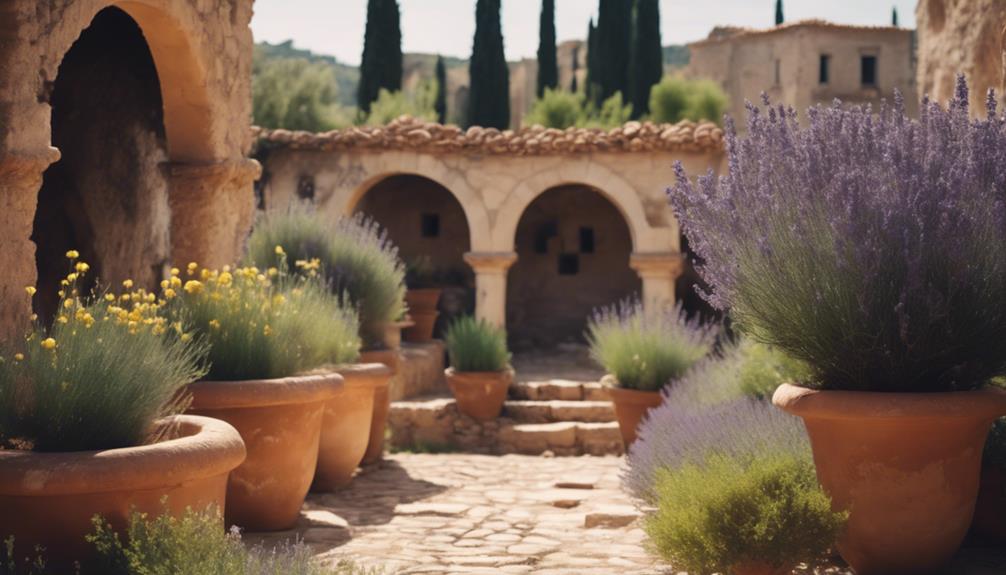
Delving into the Mediterranean region, we uncover a treasure trove of medicinal marvels, where the climate and soil conspire to create a haven for potent herbs like lavender, oregano, and thyme. As we explore the Mediterranean coastlines, we'll discover herbs like rosemary and sage, widely used in traditional medicine for their therapeutic benefits. At least one visit to herbology hotspots like Provence in France and Tuscany in Italy will offer a rich experience in discovering potent herbs for healing.
Next, we'll explore the Mediterranean climate, which supports the growth of potent medicinal herbs like marjoram, known for its aromatic and medicinal properties. Our journey will also take us to uncover the healing properties of herbs like basil and mint, essential for crafting potent remedies.
Here are the top Mediterranean herbology locations to add to our itinerary:
- Provence, France: Known for its lavender fields and picturesque countryside, Provence is a haven for herbalists.
- Tuscany, Italy: This Italian region is famous for its rolling hills, charming villages, and an array of medicinal herbs.
- Greek Isles, Greece: The Greek Isles offer a unique blend of Mediterranean flora, with herbs like oregano and thyme growing in abundance.
Discovering North America's Botanical Gems

As we venture into the heart of North America, the diverse landscapes of the continent unfold before us, revealing a treasure trove of botanical gems waiting to be discovered.
From the lush forests of the Heartlands to the serene shores of Dakota River, we'll uncover a wealth of herbology locations that'll take our skills to the next level.
We'll forage for rare herbs like yarrow, bulrush, and oleander sage, each with its unique properties and uses. In Diablo Ridge, we'll seek out Indian tobacco, a valuable find for any aspiring herbalist.
Valentine, Lamoyne, and O'Creagh's Run are also must-visit destinations, offering a diverse array of herb species to aid in our herbalist challenges and crafting endeavors.
As we immerse ourselves in this rich botanical landscape, we'll hone our skills, uncover hidden gems, and gain a deeper appreciation for the region's natural wonders.
With each new discovery, we'll become more adept at harnessing the power of plants, and our passion for herbology will continue to flourish.
China's Ancient Herbal Traditions
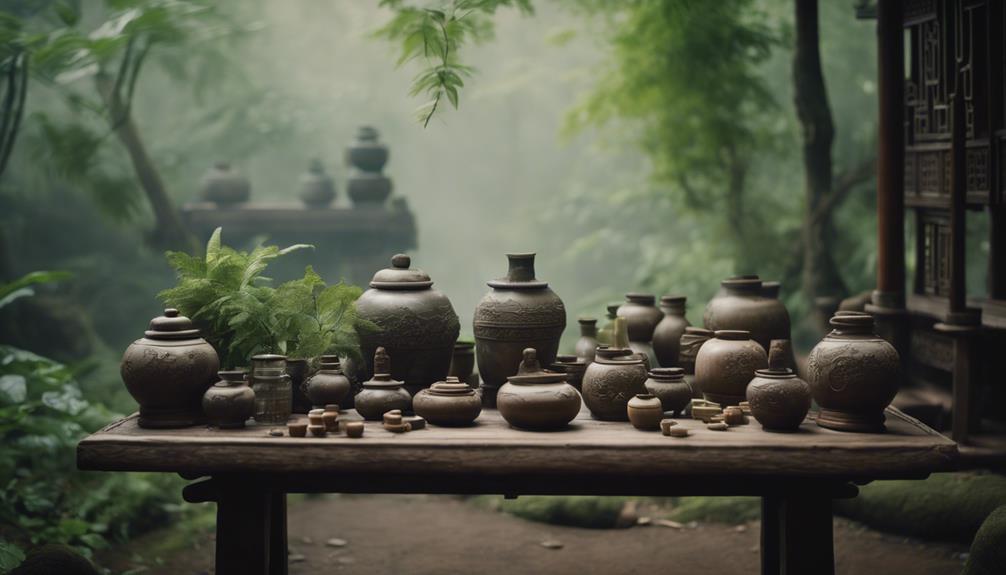
We explore the ancient wisdom of China, where a 5,000-year-old heritage of herbal medicine has shaped the country's approach to health and wellness.
Traditional Chinese Medicine (TCM) relies heavily on a vast array of herbs and botanicals for healing. The Chinese Pharmacopoeia lists over 6,000 medicinal substances, including herbs, minerals, and animal products.
China's herbal traditions emphasize the balance of yin and yang energies for holistic health and wellness. This approach has led to the development of unique herbal treatments, such as those found at the Shaolin Temple, famous for its herbal remedies for martial artists.
Here are three key aspects of China's ancient herbal traditions:
- Rich History: China boasts a rich history of herbal medicine that dates back over 5,000 years.
- Holistic Approach: China's herbal traditions emphasize the balance of yin and yang energies for holistic health and wellness.
- Diverse Remedies: The Chinese Pharmacopoeia lists over 6,000 medicinal substances, including herbs, minerals, and animal products.
Unveiling the Secrets of Ayurveda

As we explore the world of Ayurveda, we're drawn to the rich heritage of this ancient healing system.
We're about to uncover the roots of Ayurvedic healing, the principles of dosha balance, and the secrets of ancient Indian herbalism.
Ayurvedic Roots of Healing
Let's explore the ancient wisdom of Ayurveda, where nature's pharmacy intersects with personalized medicine, and uncover how this holistic approach can revolutionize our understanding of health and wellness.
As we investigate the Ayurvedic roots of healing, we discover an intricate system that emphasizes balance and harmony between the mind, body, and spirit. This ancient Indian practice relies on natural remedies, including herbs like Ashwagandha, Turmeric, and Tulsi, to promote overall well-being.
Here are three key aspects of Ayurveda's holistic approach:
- Personalized treatments: Ayurvedic practices focus on individualized treatments based on an individual's unique constitution or dosha.
- Root cause treatment: Ayurvedic herbal remedies aim to address the root cause of health issues rather than just treating symptoms.
- Lifestyle adjustments: Ayurvedic principles promote the use of herbs, spices, and lifestyle adjustments to achieve balance and harmony in daily life.
Principles of Dosha Balance
By exploring the principles of dosha balance, we can uncover the secrets of Ayurveda and discover how to harmonize our unique constitution for peak health and well-being.
In Ayurveda, the three doshas – Vata, Pitta, and Kapha – must be balanced to maintain peak health. Understanding our individual dosha constitution helps us select the right herbs and practices to restore balance.
We can use herbs to support dosha balance and address specific health concerns. Ayurvedic herbology considers the energetic properties of herbs to harmonize the doshas and promote healing.
By exploring herbology locations, we can gain insight into traditional Ayurvedic practices and the use of herbs for holistic healing.
Ancient Indian Herbalism
In the heart of India, we uncover the roots of ancient Indian herbalism, an intricate system that has been finely tuned over thousands of years to harmonize body, mind, and spirit through the power of natural remedies. This system, rooted in Ayurveda, emphasizes balance and harmony, and has been refined over thousands of years.
As we explore further, we discover the significance of herbs like Ashwagandha, Turmeric, and Triphala, renowned for their healing properties and integral to traditional Indian medicine.
Here are some key aspects of ancient Indian herbalism:
- Ayurvedic Pharmacopoeia: The Ayurvedic Pharmacopoeia of India lists over 400 medicinal plants, highlighting the extensive herbal knowledge and practices in ancient Indian herbalism.
- Herbal Gardens: Herbal gardens at Ayurvedic centers in Kerala, India, showcase a rich variety of medicinal plants used in treatments for various ailments.
- Personalized Treatments: Ayurvedic practitioners utilize herbs, spices, and oils in personalized treatments to restore harmony and promote well-being based on individual body types (doshas).
As we investigate the intricacies of ancient Indian herbalism, we begin to appreciate the depth and richness of this ancient system, and its ongoing relevance in modern times.
Africa's Diverse Herbal Heritage

Exploring Africa's rich herbal heritage, we discover a vast array of over 30,000 plant species used for medicinal purposes, with traditional healers relying heavily on herbs to treat various ailments and maintain health.
This rich cultural heritage has been passed down through generations, with herbal medicine playing a significant role in African culture. Countries like South Africa and Nigeria are renowned for their diverse herbal traditions and healing practices.
Visiting herbal markets in these countries provides insight into the vast array of medicinal herbs available. We're struck by the importance of herbalism in African society, where traditional healers continue to rely on herbs to treat a range of health issues.
From treating common ailments to maintaining overall health, herbs are an integral part of African healthcare. As aspiring herbalists, we can learn a great deal from Africa's diverse herbal heritage, and exploring these locations provides a unique opportunity to investigate further into the world of herbalism.
Frequently Asked Questions
Where to Start With Herbology?
When starting herbology, we wonder where to begin. We've all been there – overwhelmed by the vast world of herbs and unsure of how to take the first step.
To get started, we recommend setting clear goals for what we want to achieve in herbology, whether it's to improve our health or create natural remedies. Then, we can research and gather information on the herbs that align with our goals.
Where Is the Best Place to Study Herbalism?
As we start on our herbalism journey, we often wonder where to hone our skills. The best place to study herbalism depends on our goals and expertise.
Are we beginners looking to learn the basics, or advanced herbalists seeking rare species? Do we want to focus on medicinal herbs or explore unique environments?
Before choosing a location, we must define our objectives and assess our current level of knowledge to find the perfect fit.
Where Do Herbalist Make the Most Money?
We've found that as herbalists, we can rake in the most cash by collecting and selling rare herbs like ginseng, orchids, and agarita.
Certain locations like Big Valley, Roanoke Ridge, and Bayou Nwa are hotspots for high-value herbs. By focusing on areas with abundant growth and high demand, we can maximize our earnings.
Rare finds like ghost orchids and lady of the night fetch top dollar in specific regions, and selling them in towns like Valentine and Saint Denis can lead to significant profits.
Is There a Demand for Herbalists?
We can confidently say that yes, there's a demand for herbalists. As villages rely on them for healing and medicinal needs, herbalists play an important role in maintaining health and well-being.
Their expertise in resource management and efficient production also makes them essential for village productivity. With villagers dependent on their services, it's clear that herbalists are in high demand, making their role indispensable to the community.
Conclusion
As we conclude our herbology journey, imagine a giant map with threads connecting Amazonian vines to Indian spice markets, Mediterranean olive groves, and Chinese apothecaries. These threads weave a tapestry of ancient wisdom, where Ayurvedic principles meet African herbal traditions.
We've uncovered the world's hidden herbal treasures, and now it's time to tend to our own gardens, cultivating a deeper understanding of the medicinal marvels that surround us. As we tend, we'll uncover the secrets hidden within the petals, leaves, and roots of our planet's precious flora.
Herbology
10 Steps Guide to Herbology Class at Hogwarts Legacy
Journey into the magical world of Hogwarts Legacy's Herbology class, where you'll uncover the secrets of magical plants and potions.

We begin our Herbology class at Hogwarts Legacy by arriving at the Greenhouses, where we meet passionate Professor Garlick. Next, we plant Dittany seeds, explore the First Greenhouse, and learn to handle Mandrakes with care. We then master Chomping Cabbages, access Knotgrass Sprigs, and navigate the Second Greenhouse. As we complete the class, we set up a potting station, interact with the Small Planter, and choose a Dittany pouch for planting. We learn essential plant care skills, observe magical plants' characteristics, and utilize Dittany seeds in potion-making. As we progress, we'll uncover more secrets of magical plants and potions ahead.
Key Takeaways
• Attend the Herbology class, meeting Professor Garlick and exploring the greenhouses to understand magical plants and their uses.
• Plant and handle magical plants like Dittany seeds, Mandrakes, and Destiny Seeds, following safety guidelines and growth conditions.
• Learn about the properties and uses of magical flora, such as Chinese Chomping Cabbages for defense and Knotgrass Sprigs for potion-making.
• Engage in practical activities, including selecting and planting seeds, exploring diverse magical flora, and collecting Fluxweed Stems and Mallowsweet Leaves.
• Follow growth times, patience, and delicate handling procedures to ensure the successful cultivation and preservation of magical plants.
Arriving at the Greenhouses
As we make our way to the Hogwarts grounds, we head towards the Greenhouses area, thrilled to begin our Herbology class. The Greenhouses are a peaceful oasis, filled with an array of magical plants that we can't wait to learn about.
We're particularly intrigued by the Chinese Chomping Cabbages, which we've heard are quite the handful. As we enter the Greenhouses, we're immediately struck by the sights and sounds of the magical flora surrounding us.
We take a deep breath, feeling the earthy scent of the soil and the fresh air filling our lungs. We can't help but feel a sense of wonder and curiosity as we gaze around at the various plants, each one more fascinating than the last.
We're excited to learn about the care and handling of these magical plants, and we're looking forward to see what our Herbology class has in store for us. With our wands at the ready, we're prepared to explore the world of magical botany and uncover the secrets of the wizarding world.
Meeting Professor Garlick

We're greeted by Professor Garlick, a warm and experienced wizard with a kind smile, who welcomes us to the Herbology class and begins to introduce herself as our guide through the fascinating world of magical botany.
As we take our seats, she explains that in this class, we'll explore the magical properties of plants and how they're used in potion-making. Professor Garlick emphasizes the importance of plant care, stressing that even the slightest mistake can have disastrous consequences.
She walks us through the greenhouses, pointing out various specimens and sharing interesting facts about each one. We're encouraged to ask questions and participate in hands-on activities, getting up close and personal with the magical flora.
As we interact with Professor Garlick, we can sense her passion for Herbology and her dedication to teaching us the intricacies of this complex subject. With her guidance, we're excited to set off on this journey, uncovering the wonders of magical botany and discovering the secrets of the Herbology class.
Planting Dittany Seeds
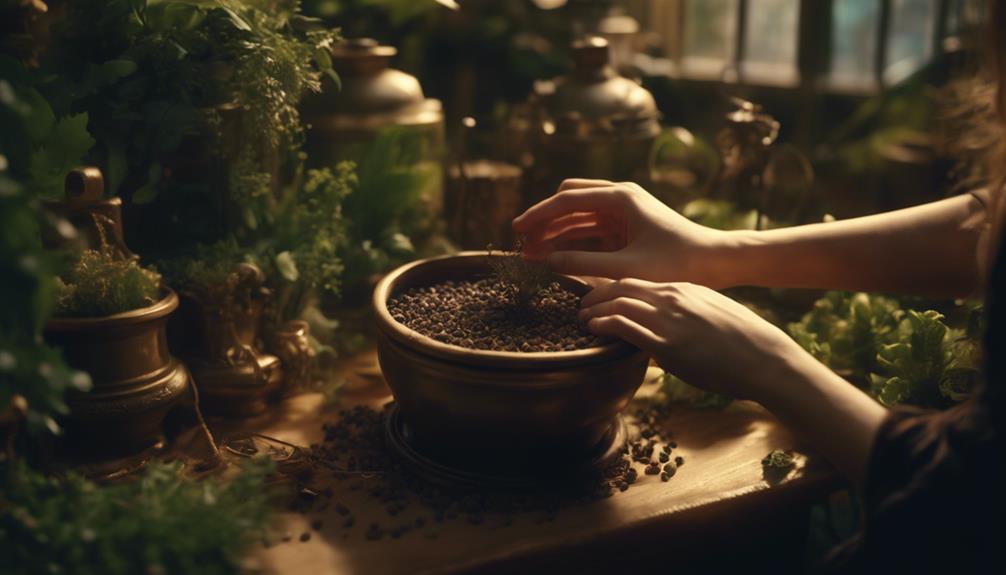
We take our first step in magical botany by selecting the Dittany pouch at the Potting Table, excited to plant the seeds that will eventually become an important ingredient in our potion-making journey.
To begin, we interact with the Potting Table and choose the Dittany pouch, which contains the precious seeds we're about to plant. We carefully place the seeds in a small planter, making sure to follow the instructions provided.
It's vital to understand that Dittany seeds have specific growth times in real-life minutes before they can be harvested, so we'll need to be patient and let them grow. As we wait, we can think about how these seeds will eventually help us craft Wiggenweld Potions, which will restore health in Hogwarts Legacy.
Planting Dittany seeds is an important step in our Herbology class, and we're excited to see our hard work pay off.
Exploring the First Greenhouse

In the first greenhouse, where the rustic scent of damp earth and greenery fills the air, we explore the magical world of Herbology under the guidance of Professor Garlick and Leander Prewett. As we step into this enchanting space, we're surrounded by the sights and sounds of magical plants, each with its unique properties and uses.
We take our places at the Potting Table, where we'll learn the art of planting and caring for these extraordinary specimens. Under the watchful eyes of our professors, we'll uncover the wonders of Mandrakes, Dittany, and Chinese Chomping Cabbages, among others.
As we investigate further into the world of Herbology, we'll reveal the practical applications of these magical plants, from healing potions to defensive charms. With every lesson, we're one step closer to mastering the art of magical horticulture.
Handling Mandrakes With Care

As we explore the art of handling Mandrakes with care, we'll discuss the essential precautions and best practices to guarantee our safety and the healthy growth of these magical plants.
We'll cover the must-knows of Mandrake handling, from safety precautions to storage tips, to help us navigate the world of magical botany.
Mandrake Handling Essentials
Wearing earmuffs to protect our ears from the Mandrake's deadly cry, we cautiously approach the plant to guarantee safe handling. As we carefully lift the Mandrake from the pot, we make certain not to disturb its roots, taking care not to touch its sensitive stem. We've learned that Mandrakes are delicate creatures, requiring gentle care to thrive. Our professor emphasizes the importance of handling Mandrakes with precision, as any rough movement can cause the plant to release its deadly cry.
We take turns carefully replanting the Mandrake, ensuring that the soil is moist but not waterlogged. As we work, our professor provides guidance, demonstrating the proper techniques for Mandrake care. With each successful replanting, we gain confidence in our ability to handle these magical plants. By following these essential steps, we're able to master the art of Mandrake handling, guaranteeing the continued growth and health of these valuable plants.
Mandrake Safety Precautions
We take extra precautions when handling Mandrakes, recognizing that one misstep can have disastrous consequences. One wrong move can lead to those infamous, ear-piercing screams, which is why we always wear earmuffs to protect our eardrums.
We handle Mandrakes with care, making sure not to drop them, as the impact could trigger a chomping response. A gentle touch is essential when planting them in well-drained soil, ensuring they receive the right amount of water – not too much, not too little. Overwatering can be detrimental to their health, and we can't afford to make such mistakes.
When extracting Mandrake roots for potion-making, we exercise extreme caution, aware of their potent magical properties. We can't afford to be careless; one misstep could have devastating effects. By following these safety precautions, we minimize the risks associated with handling Mandrakes, ensuring a safe and successful Herbology class.
Mandrake Storage Tips
In our Herbology class, we store Mandrakes in a cool, dark place to preserve their magical potency. This is essential in maintaining their effectiveness in our potions and spells. To guarantee our Mandrakes remain healthy and potent, we follow specific storage guidelines.
Here are some essential tips to keep in mind:
- Store Mandrakes in well-ventilated containers to prevent mold or decay.
- Avoid prolonged exposure to sunlight or extreme temperatures to prevent wilting.
- Keep Mandrakes away from water or damp conditions to avoid rotting.
- Properly label Mandrake containers to prevent mix-ups with other magical plants.
Discovering Destiny Seeds

As we explore the world of Herbology, we come across an essential component in potion-making: Destiny Seeds. These magical seeds are a pivotal element in crafting potions, particularly those used for healing and restoration. Destiny seeds possess potent restorative properties, making them highly sought after by potion-makers.
To utilize these seeds, we need to understand their growth requirements and care. By planting them at potting tables, we can nurture and harvest them for our magical pursuits. Harvested Destiny seeds can be used in a variety of potions to aid in combat and magical endeavors. Their restorative properties make them an invaluable asset in our potion-making journey.
As we investigate further into the world of Herbology, mastering the cultivation and use of Destiny seeds will become an essential skill for any aspiring potion-maker. By grasping the intricacies of Destiny seeds, we'll uncover new possibilities in our magical pursuits.
Mastering Chomping Cabbages

I'll explore the world of magical plants with a focus on Chinese Chomping Cabbages, potent defensive tools in combat scenarios. These unique plants can be a game-changer in combat, but only if we grasp how to utilize them effectively.
To get the most out of Chinese Chomping Cabbages, we need to know how to care for them and deploy them in battle. Here are some key takeaways:
- Chinese Chomping Cabbages can be fed to a dummy for practice, allowing us to fine-tune our combat strategy.
- They exhibit quick and efficient combat abilities against enemies, making them a valuable asset in battle.
- The cabbages have specific growth requirements and characteristics that players need to comprehend for best use.
- Mastering Chinese Chomping Cabbages can enhance our overall combat strategy in the game.
Unlocking Knotgrass Sprigs

We venture into the world of Knotgrass Sprigs, an essential component in potion-making, and uncover the secrets to harvesting these magical sprigs.
As we explore the Hogwarts grounds, we discover that Knotgrass plants can be found in specific locations, identified by their distinct long, thin leaves. To acquire the coveted Knotgrass Sprigs, we must interact with these plants, taking care to handle them delicately to preserve their magical properties.
These sprigs are pivotal in potion-making, with various recipes relying on their unique effects. In our Herbology journey, we'll find that Knotgrass Sprigs play a critical role in potion-related activities and quests.
Mastering the art of harvesting these sprigs is essential to revealing the full potential of our potions. With careful attention to detail and a gentle touch, we can reveal the secrets of Knotgrass Sprigs and elevate our potion-making skills to the next level.
Navigating the Second Greenhouse

Venturing into the second greenhouse, we're immediately struck by the diverse array of magical flora awaiting us. As we explore this new environment, we're tasked with collecting specific herbs and utilizing the Chinese Chomping Cabbages we gathered earlier.
Here's what we need to do:
- Collect Fluxweed Stems and Mallowsweet Leaves on our way to the second greenhouse
- Grab Chinese Chomping Cabbages from the other greenhouse for defensive purposes
- Use the Tool Wheel to assign Chinese Chomping Cabbages for attacking the target dummy
- Return to Professor Garlick after completing the tasks in the second greenhouse to conclude the Herbology class
With our Tool Wheel at hand, we can strategically deploy the Chinese Chomping Cabbages to take down the target dummy with ease. Remember, these cabbages are efficient in combat scenarios, making quick work of enemies.
Completing the Herbology Class

As we near the end of the Herbology class, we're focusing on the essential tasks that'll help us complete the lesson successfully.
We'll start by setting up our potting stations, making sure we've everything we need within arm's reach.
Next, we'll review the plant care essentials, ensuring our magical plants receive the attention they require to thrive.
Potting Station Setup
Now that we've begun our Herbology class, it's time to set up our potting station by interacting with the Small Planter at the Potting Table. This is where we'll get our hands dirty and start growing some magical plants.
To set up our station, we'll need to follow the on-screen instructions carefully.
Here's what we need to do:
- Choose the Dittany pouch to plant Dittany seeds for potion-making
- Understand that plants have specific growth times in real-life minutes before harvesting
- Utilize Dittany plants to craft Wiggenweld Potions for health benefits
- Follow the on-screen instructions to successfully complete the potting station setup in Herbology class
Note that Fluxweed Stems aren't needed for this part of the class, so we can focus on our Dittany plants for now.
Plant Care Essentials
With our potting station set up and Dittany seeds planted, we're ready to explore the fundamentals of plant care and nurturing in Professor Garlick's Herbology class.
Now it's time to immerse ourselves in the essential skills required to keep our magical plants thriving. We'll learn how to handle Mandrakes under Professor Garlick's guidance, ensuring we can replant them successfully.
By observing our Dittany seeds' growth, we'll gain a deeper understanding of the unique characteristics of magical plants. But that's not all – we'll also investigate the defensive capabilities of Chinese Chomping Cabbages by feeding them to a training dummy, witnessing their remarkable abilities firsthand.
As we delve further into plant care, we'll discover the restorative properties of Dittany seeds and their significance in potion-making. Through hands-on activities, we'll gain practical knowledge of magical plants' applications in combat scenarios, preparing us for the challenges that lie ahead.
Frequently Asked Questions
How to Go to Herbology Class in Hogwarts Legacy?
We're excited to head to Herbology class in Hogwarts Legacy!
To get there, we activate our Charmed Compass, which reveals a golden wisp trail leading us to the class.
We simply follow the trail, then press the designated button to initiate the quest.
Easy peasy!
How to Get Herbology 3 Hogwarts Legacy?
We're excited to access Herbology 3 in Hogwarts Legacy, but what's the secret to getting there?
To progress, we need to make headway through the main story and attend Herbology classes. Completing tasks in previous classes might be necessary to reach the next level.
We're looking forward to new magical plants, intricate planting techniques, and advanced potion-making mechanics. Let's interact with Herbology professors and master plant-related skills to reach Herbology 3.
How Do You Use 3 Plants at Once in Hogwarts Legacy?
We can use three plants at once in Hogwarts Legacy by assigning them to our Tool Wheel.
To do this, we hold and tap the right stick on our controller to open the Tool Wheel, then select the desired plants from our inventory.
This strategic move allows us to utilize the unique abilities of each plant simultaneously, making combat and tasks more efficient.
How Do You Plant Herbs in Hogwarts Legacy?
We plant herbs in Hogwarts Legacy by interacting with the Potting Table. We choose the specific herb pouch we want to plant, considering each herb's unique growth time and properties.
Following the on-screen instructions, we successfully plant and care for our magical herbs. Understanding each herb's growth requirements and uses is vital for mastering Herbology in the game.
Conclusion
As we conclude our 10-step journey through the Herbology class at Hogwarts Legacy, we've mastered the art of handling magical plants with care.
From planting Dittany seeds to exploring the second greenhouse, we've revealed the secrets of this ancient magic.
But the question remains: what other mysteries lie hidden in the world of Herbology, waiting to be discovered?
-

 Herbalism2 months ago
Herbalism2 months agoDoes Herbalism Actually Work?
-

 Anti Aging2 months ago
Anti Aging2 months agoMost Effective Anti-Aging Drink: 5 Top Picks
-
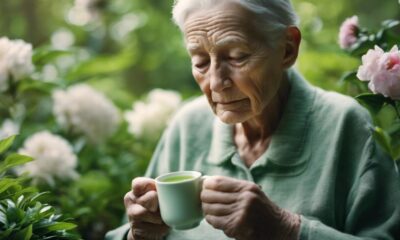
 Anti Aging2 months ago
Anti Aging2 months agoWhich Tea Increases Lifespan?
-

 Bone Health2 months ago
Bone Health2 months agoHerbal Secrets Unleashed: Boost Bone Density
-

 Anti Aging2 months ago
Anti Aging2 months agoThe Immortal Herb: Unveiling Its Special Qualities
-

 Anti Aging1 month ago
Anti Aging1 month agoAstragalus: The Ultimate Anti-Aging Herb
-
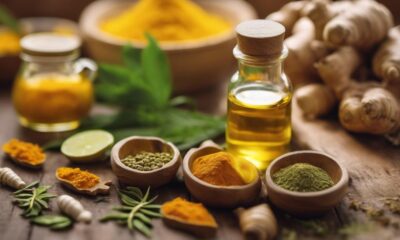
 Inflammation Management2 months ago
Inflammation Management2 months agoBest Natural Medicines for Joint Inflammation Relief
-
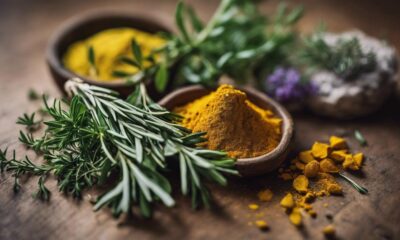
 Mental Health2 months ago
Mental Health2 months agoBest Herbs for Boosting Brain Health


















